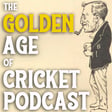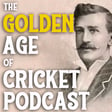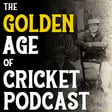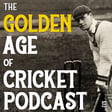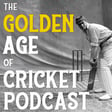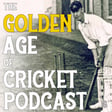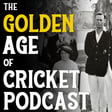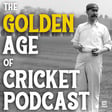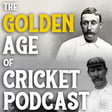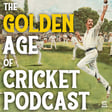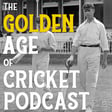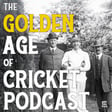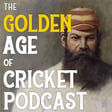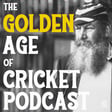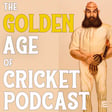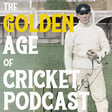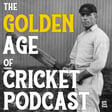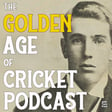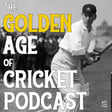Albert Trott's Heroics in the 1894-95 Series
00:00:09
Speaker
Returning to that great 1894-95 series, so after Albert's heroics in the third test in Adelaide, in which ah he is almost single-handedly responsible for bringing up Australia's first victory, so the series is now 2-1 in England's favour, or the fourth test match in something quite odd happens.
Captaincy Decisions and Team Dynamics
00:00:34
Speaker
Harry opens the bowling, ah bowling his leg breaks, and Albert doesn't bowl at all. This is after he's taken those match-winning figures of eight for 43.
00:00:44
Speaker
um Surprise, surprise, George Giffen's captaining. He's the captain now after Blackham got injured in the first test. So you mentioned Giffen's captaincy style before.
00:00:56
Speaker
What do you think is the reasoning behind Albert Albert Trott not bowling at all in the fourth test? It is hard to know, but I know that Giffen bowled a lot.
00:01:07
Speaker
And I think he thought that the batsman might not be used to the the the spin bowling of Harry. Harry actually took three for 21. So you'd hardly say the move failed.
00:01:18
Speaker
I don't know I really haven't seen a reason. And no one asks appeared to have asked George Giffen why he didn't bowl him at all. ah but it maybe was one of George's whims because he had quite a few of those.
00:01:31
Speaker
And ah in the end, though, we did he did save them with a bat again. He got 85 and pulled them out of a hole again and put them on the path to another
Albert's Season Performance and Future Prospects
00:01:43
Speaker
And that season, he he didn't do so much in the fifth test, which Australia lost, but he did in the season. He he scored 472 runs and took 35 wickets. That's a pretty good summer in reduced performance.
00:01:57
Speaker
They don't play as many games as they do now. ah That's a pretty good effort and, you know, stamped him out as yeah a player of the future, as they say.
Controversial Team Selections and Exclusions
00:02:07
Speaker
But the future didn't happen quite the way that we thought. No, it certainly didn't. um And that 85 he hit in the fourth test, I think became his highest test score um in just his second test. I just like the fact that Harry opens the bowling with his leg spin deliveries. I mean, we we see in sort of T20 cricket these days the...
00:02:31
Speaker
the novelty of innings opening with a spin bowler. But, you know, we look at cricket from 120 years ago and they were doing exactly the same. It's not a new idea at all.
00:02:42
Speaker
No, the first time that I think a captain threw two really quick bowlers at any one was Warwick Armstrong with Jack Gregory and Ted McDonald after the First World War. The Yeah, good point. Before then, you know, you'd have usually a quicker bowler at one end and a spinner at the other.
00:02:59
Speaker
Yeah, yeah. It's the variation and it's the, I suppose, the unpredictability of it all, which was the philosophy behind it. um So after this remarkable couple of games from Albert 1894-95 you would be...
00:03:18
Speaker
Mistaken for thinking he would be a surefire selection in the 1896 tour to Australia, but something incredible happens. So Harry ah makes the team and ends up being the captain, but Albert is left out of the 14-man squad.
00:03:35
Speaker
And quite sensationally, he never plays for Australia again. ah You know, for two brothers who are seemingly on their way up together into the Australian team, for this to happen must have been quite shocking.
00:03:48
Speaker
ah One is named captain and the other is left off the tour, the seeming wunderkind as he's coming through. So how do we, well, what's the background to all
Betrayal and Relationship Strains
00:03:59
Speaker
this, Rick? How do we assess it today?
00:04:02
Speaker
it's I think it's attracted more attention today than it probably did then. Albert's form in 1895-96 was pretty average.
00:04:13
Speaker
He scored 134 runs at 13.4 and took 17 wickets at 25.94. They're not great figures, ah but particularly not compared to his previous summer.
00:04:25
Speaker
The guy who took the spot that most people thought Albert would have got was Charlie Eadie from Tasmania. Now, I might be biased as a Tasmanian, But in Charlie Eadie got very few opportunities to play.
00:04:38
Speaker
In 1894-95, he became the first Australian to score 100 in each innings of a match. That was the only first-class game he played that summer. The next summer, 1895-96, he gets one game and takes 12 wickets.
00:04:53
Speaker
And he gets the spot. um and And I don't know if if there's anything to do with Albert's personality or not in that.
00:05:03
Speaker
But there was outcry, principally in Victoria, which you would expect, but not as much as you might have thought because there were other controversies that
Harry's Leadership and Challenges
00:05:14
Speaker
um mean, there's a guy called Jack Harry who was initially picked but who was injured and not fit and... there were a lot of to-ing and fro-ing about whether Harry would play. In the end, they paid him £150 not to go um the manager The manager resigned, Harry Musgrove, and then reappointed himself a few days later.
00:05:34
Speaker
um So there was a lot of stuff going on in the press. And and the omission of Albert, while a lot of people regretted it, thought they didn't make that much about it. If you want to compare it with with something...
00:05:48
Speaker
um, compare it with Ross Gregory in the 1930s. He played really well against England in 36, 37. Everyone thought he'd be on the England tour in 1938, but he had a rough season. The next season didn't make the tour.
00:06:02
Speaker
So, so it has happened, um, on occasions. Albert thought Harry should have got him in the team. And there's no question about that. You got your brother on the, in the team and he should have been in it.
00:06:17
Speaker
But, uh, He wanted Harry to do what George Giffen had done for his his brother Walter back in 1893, and Harry didn't do it. You've also got to remember that Harry was not the captain at the time the team was picked.
00:06:33
Speaker
right Harry was appointed the captain after the team was selected, much to the chagrin of George Giffen.
Albert's New Beginnings in England
00:06:41
Speaker
who had been the captain in the last series and missed missed out to the Collingwood postman.
00:06:47
Speaker
Yes. Yeah, indeed. um Just a ah couple of things there, Rick, just to double back on. You mentioned, ah you said at one point, I wonder if that was possibly due to Albert's personality. yeah Can you maybe explain a bit more then? Was he difficult to deal with?
00:07:07
Speaker
He was certainly a player that didn't look after himself. Right. if we want to put it that way. um Now, ah Harry had had seen players in 1893.
00:07:19
Speaker
There were all kinds of arguments about guys drinking and arguing and fighting and goodness knows what. And there were ructions in all of Harry's three previous tours. I don't know if that had anything to do with it. I don't know if Harry's personality had, Albert's personality had anything to do with it.
00:07:37
Speaker
But I think if you look at his form in the previous season, it wasn't great. um So there would be a justification on form for leaving him out. It's hard to look back and say, oh, yeah, well, he was really good three years ago. We'll stick him in it. Yes. um It doesn't always work like that.
00:07:56
Speaker
And so he missed out. So it's hard to know. No one wrote anything about it at the time. um The worst you get is, oh, it's disappointing. that
Harry's Health Decline and Leadership
00:08:06
Speaker
a player of such ability didn't make the tour, but they don't really go into details as to why.
00:08:11
Speaker
Adding salt to the wound for Albert is the fact, you mentioned it before, that he'd seen something similar happen with Walter Giffen and George Giffen, and he probably just naturally assumed, and then it didn't happen.
00:08:24
Speaker
um So can we ascertain 130 years later, what this... what this actually did to the Trott brothers' relationship?
00:08:36
Speaker
Was it ah damaging? I would say it destroyed it. and And I think that's maybe even too mild a word for it. and they They just didn't get on.
00:08:48
Speaker
There's no record of any correspondence between them. wow There's no record of the meeting either in England or Australia. There is one, and I'm not sure if it's a fanciful story or not, of them passing each other in the streets.
00:09:02
Speaker
And one of them said, hello, brother, to which the other one replied, hello, brother, and they just kept walking past each other. Now, I'm not sure how true that is, but that could kind of sum up the relationship.
00:09:14
Speaker
It was interesting that when Albert came back to Australia a couple of times, he didn never visited Harry. And what's even more interesting is that when Albert died,
00:09:25
Speaker
And Harry expressed no condolences at all. You would have expected he might have said something in the paper, oh, this is very sad, um but there's nothing. He never wrote anything.
00:09:38
Speaker
um So, you know, it was a destroyed relationship, that that one decision. broke it. And it must have been an interesting voyage, mustn't it? Because they were all on the same ship down to England. MUSIC PLAYS
00:09:57
Speaker
now you can claim a yellowow street you see but no one' stopping in clothess but me beside a thing i see my brother coming home right now So if we go to the 1896 tour, Australia in England, um Harry is eventually named captain.
00:10:21
Speaker
i was thinking recently, I mean, if we take Clem Hill, who was a very late inclusion on that tour 19-year-old, He later in life um spoke incredibly highly of Harry Trott as a captain. And this is Clem, who played first-class cricket under George Giffen, Joe
Albert's Legendary Achievements
00:10:42
Speaker
Darling, Hugh Trumbull, and of course, um Monty Noble was the other one.
00:10:47
Speaker
But he always put Harry Trott as the greatest captain he ever had. um So how do we assess the 1896 tour and the captaincy of Harry Trott?
00:10:59
Speaker
Well, it was certainly much more successful than the three previous tours that Harry had been on. He was very, as I've said before, when he got the captains, he was very experienced cricketer and he knows what not to do as well as what to do.
00:11:14
Speaker
He'd seen what an unsettled batting order did and and he determined not to... not to do anything about that, yeah you know, not to have that repeat itself.
00:11:25
Speaker
ah His encouragement of people like Clem Hill, um there is a... Clem Hill dropped a catch off WG Grace ah in the two early in the tour, and he was absolutely distraught. He just dropped that, you know, oh, my God, I've dropped Grace. What's going to happen?
00:11:41
Speaker
Harry just walked over, put his arm around his shoulder and said, don't worry, son, everybody on this field's dropped catches. Better luck next time. Patted him on the back and walked off. no No temperament, no, oh, what the hell are you doing kind of thing.
00:11:55
Speaker
And he refused to be, he was such a cheerful soul that he refused to be upset by anything. MCC bowled Australia out for 18. Yes. um In one match.
00:12:07
Speaker
and And Fred Spofforth, who was living in England, he came to see Harry. and um and And he was commiserating with Harry. This is terrible. This is dreadful.
00:12:17
Speaker
ah How is it? And Harry said, oh, yeah, terrible, isn't it? Couldn't be worse. Nothing could be worse. He said, tell me, said, any good leg shows on at the theatre? So, you know, and he had, his party trick was a hypnosis act where he pretended to put people under a hypnosis.
00:12:35
Speaker
Right. And one of his subjects actually refused to wake up, just pretended that he was still out to it. and Harry, when Harry wanted to wake him up, the bloke wouldn't wake up. And apparently the players thought it was hilarious because Harry started to panic that he might really have put this guy under hypnosis. And yeah, he was just a, to them, he was a lovable character.
00:12:57
Speaker
Yes. um A real lovable character. and And I think he's one of those guys that they would follow him anywhere. That is the impression that is given. Clem also tells the story. It's during that tour and it's during ah one of the um just tour matches. I think it's against Lancashire or something.
00:13:15
Speaker
um Harry is in the pavilion next in and I think he's smoking a cigar, ah possibly a pipe, and a wicket falls. So out he goes. He puts his pipe down.
00:13:28
Speaker
ah goes out, gets out for a duck, and he comes straight back in and says, oh, it's still a light, great, and he sits down and just keeps smoking. He seemed to have this very relaxed attitude, which, as you say, considering the previous tours, was probably his greatest contribution on the 1896 tour, was just keeping everyone steady and relaxed,
00:13:54
Speaker
um And, is you know, that 1896 tour um i think is seen as one of the great levelling tours for Australia because then after that you get Joe Darling's captaincy.
00:14:06
Speaker
He then has three... Well, they win the yeah they win the Ashes back the next series. Exactly. And then there's... a real sort of balance between the two sides, Australia and England and Joe brings his style of captaincy. And so um i think Harry is often seen as sort of getting Australia back on track.
00:14:25
Speaker
um And, you know, some, we, we often put too much pressure on the captain to do everything, bat and bowl and field placings. And perhaps their greatest contribution is just the team management side of things. so um And we, and we forget that,
00:14:40
Speaker
You know, in the 19th century, venturing to England for a few months was an incredibly big adventure, especially for someone like Clem, who's 19 years old.
00:14:51
Speaker
ah You would need a father figure, I suppose, someone who's done it before, like Harry, to be a mentor. And someone who doesn't doesn't worry too much about things when they go wrong. Yes. There's an in interesting comment from one of the one of the England players.
00:15:08
Speaker
who said that he thought Harry was a poor captain. And said, well, why is he a poor captain? He said, well, he said, we found his tactics unsettling because we couldn't work out how his but what his plan was.
00:15:21
Speaker
And I thought, well, fancy that. yeah yeah It's the complete ah opposite of what he actually is. Yeah, fancy that. um Now, Rick, you hinted at this before. So we've discussed the rupture between Albert and Harry following Albert's non-selection on the 1896 tour to England.
00:15:43
Speaker
What Albert does next is he decides to leave Australia permanently and goes to England to live And remarkably, he yeah he catches the same same ship ah that Harry and the Australian team are on, which seems a bit strange. But again, this is 1896. They don't have three flights to England every day. So perhaps it was just what was available. But he's on the same ship and he he sets up a new life for himself in England.
00:16:13
Speaker
um The rules at the time in the county championship meant he had to reside for two years before qualifying. yeah for the county championship, but he could still play the odd first class match. And he, he plays, I think for the MCC and a few other, uh, first class clubs when he does eventually qualify for Middlesex in 1898, how did he perform?
00:16:38
Speaker
Uh, he did pretty well, actually. He, um, not so much with a bat early on, but with the with the ball. He took 130 wickets at about 17, which is a pretty good start.
00:16:50
Speaker
um His batting, as I said, was less good. And it was almost like he was making up for lost time because he'd basically had two years where he could do very little, you know, maybe... If he's lucky, gets three or four games a season.
00:17:02
Speaker
yeah And so then he, yeah you know, he starts to establish a place in in the Middlesex team, and which makes Lords his home ground, which he would have enjoyed.
00:17:14
Speaker
And we go from there and then it's it's ah it's a meteoric rise and then a steady decline. And we can talk about that now. Yeah.
Harry's Recovery and Ongoing Struggles
00:17:21
Speaker
But well before the decline, ah what's really interesting with Albert, and he is, for a few reasons, you know, the question of a pub trivia quiz, because he is one of those rare um entities because he played test cricket for both Australia and England. So he's selected on the 1898-99 tour,
00:17:45
Speaker
to South Africa with Lord Hawk and he plays two test matches for England against South Africa, which is extraordinary. I think Billy Murdoch played one for England against South Africa. This is, you know, some of those old occurrences that you see in the golden age.
00:18:01
Speaker
And so he brings his total of test matches to five, if you count the three from Australia. um And then that's it for him in test cricket. So he plays five test matches, three for Australia, two for England.
00:18:15
Speaker
How do we assess his two test matches for England? ah Well, you'd have to think that South Africa were pretty weak side at the time. um They were probably of the level of one of the lower teams in the county championships.
00:18:31
Speaker
So they were pretty much cannon fodder ah for for someone with Albert's skills. And ah it took a while for them to to build up a strength in the early 1900s when they got the googly bowlers and Aubrey Faulkner and and a much better side.
00:18:48
Speaker
I would say Albert went for the money. um No other reason. Simple as that. Very good. All brother masons, brothers kind and true. When you're in trouble, they will stand by you. Poor Hiram's third degree was worse than all the other two.
00:19:09
Speaker
But he's a blue lodge mason, for they beat him black and blue. are If you're end enjoying this podcast, perhaps you'd like to support it by buying me, Tom Ford, a coffee.
00:19:25
Speaker
Every little donation helps with the production costs and also inspire me to keep going. You can support by donating as little as $5. Visit buymeacoffee.com slash goldenageofcricket.
00:19:41
Speaker
Well, then let's return to Harry, the older brother. So after coming back from the successful, well, relatively successful 1896 tour of England, he ah plays again for Australia in the 1897-98 series when England visits England.
00:19:57
Speaker
series when england visits Australia. That's the tour Andrew Stoddart leads and Rangie's involved in. But it's during ah immediately after that series that Harry's health ah declines.
00:20:13
Speaker
He loses a ton of weight while caring for his ill mother, but he also suffers from what is reported as seizures or fits. And there were a couple of reports, I think actually labeling it as epilepsy,
00:20:27
Speaker
but others were saying, or at least through modern eyes, possibly it was a mental health issue. There seemed to be a lot going on with Harry's health. What can you tell us about what was actually happening?
00:20:39
Speaker
Well, I think anyone who can find, there's a photo taken late in the, of the Australian team late in the 1897-98 series. If you look at Harry, who's seated in the front row as captain, he looks dreadful.
00:20:53
Speaker
He looks thin. He looks depressed. He looks terrible. He's very unwell. Now, it's hard to know at this distance what he actually had. I don't think, and and I must admit, I had some help in trying to analyse what was wrong with Harry by Dr Greg D'Amour, who's a clinical psychiatrist and also wrote a brilliant book on Tom Wills.
00:21:16
Speaker
yes And I ran Harry's symptoms and things past Greg to see what he had to say. We think it's unlikely that it was epilepsy because he never had the seizures again.
00:21:27
Speaker
Right. And that really often does not happen. It's possible that they could have been occurred by alcohol withdrawal. If Harry had been drinking a lot, um, and then suddenly stopped, um, you know, we might call the DTs or whatever we might, uh, want to say. And, uh, and it could have been that he also suffered from loss of memory.
00:21:51
Speaker
He had trouble remembering what was happening. Um, he, he was apathetic. He didn't really care about things. And, um, he even made threats of violence and then he was drinking heavily and he's depressed.
00:22:05
Speaker
And I believe he threatened his wife, uh, with violence. And that resulted in being admitted to cure asylum, uh, on the same day. Would you believe that the 1899 side arrived in London?
00:22:20
Speaker
Wow. All being well, he would have been captain of, um, so if you don't know much about Q, it was the major asylum in Victoria. It was called Melbourne's village of the insane.
00:22:33
Speaker
And a lovely 19th century phrase. Oh, and it had everyone from murderers to epileptics because there's no cure for epilepsy. And they locked up, uh, you know, killers who were deemed to be insane and so on were all locked up there.
00:22:51
Speaker
And, uh, The Victorian and Australian cricketer, Bob McLeod, he's Charlie McLeod's brother, he actually signed the committal papers for for Harry.
00:23:03
Speaker
And to give you some idea of the kind of um people that were admitted, I looked at the registry books and on on either side of Harry's name is a guy who was admitted for chronic self-abuse.
00:23:17
Speaker
and you can put whatever yeah yeah like on that. and And a man on the other side was a man who said that the Salvation Army paid to have him killed and was actually discovered hiding in a toilet, ah not on the seat, in the actual toilet underneath.
00:23:34
Speaker
So you get some idea of what it's just this amazing width of of society that that's in there. And so Harry's there.
00:23:45
Speaker
And I discovered ah the doctors he had at the time were the best available. that They were the best in their field. So it's not that he was um not treated properly or anything like that. He couldn't have got better treatment.
00:24:00
Speaker
Treatment for those things was was fairly basic. um They believed that the cause of madness was infection and the source of infection was body fluids.
00:24:14
Speaker
So the only treatment Harry ever received in 400 days in queue was an enema. Right. Extraordinary. That's it, you know. there's There's a description of Harry in a book by Paul Farmer and Paul Farmer had himself admitted to Q so that he could see what it was like and report on it.
00:24:34
Speaker
And he didn't name anyone. I don't know why he would do that. But anyway, he did it. And in the in the book, he talks about different patients. And he talks about ah guy who was ah once a famous sportsman who all he does now is sit there or stand there and do nothing and say nothing. And it has to be Harry.
00:24:54
Speaker
Who else is the famous? Who else is the famous sportsman? So he's he's there. and And he also attended the Lunatics Ball, which was for the inmates. Yeah, it's far from politically correct.
00:25:11
Speaker
It's nice that they had a ball. He describes the Lunatics Ball. There was also a cricket ground and and they had a team and Harry started playing for them after a time.
00:25:22
Speaker
He started to sort of get well without... um Without really any treatment. Now, the thing is that the the term that you'd used was melancholia, was the term that was used at and the time.
00:25:36
Speaker
And it's basically what we think Harry's condition was, was untreated depression coupled with alcohol abuse. Right. and And it gradually righted itself.
00:25:47
Speaker
And so he ends up being released after 400 days. Mm-hmm.
00:25:53
Speaker
So that's as close as we can get to what actually happened to him. Right. But it's interesting that a number of, ah well, a number of former players came to see him.
00:26:05
Speaker
Initially, the one who came the most was Ben Wardle, who was the secretary of the Melbourne Cricket Club. And it's it's probably pretty sure that Melbourne Cricket Club probably paid for some of Harry's treatment. and And he came and and saw him regularly.
Albert's Lasting Legacy in Cricket
00:26:19
Speaker
Alf Johns was a reserve keeper on the 1896. He visited him. Harry actually recognised him ah when he turned up. Hello, Alf. How are you?
00:26:29
Speaker
and and so he started, it basically righted itself without really any treatment on the part of the people in the asylum. And and then once he's back to normal, he's released.
00:26:41
Speaker
It's extraordinary. I mean, um we have to remind ourselves that this is the, he's admitted, ah what, within 18 months of captaining the Australian cricket side.
00:26:53
Speaker
Win the ashes. who Win the ashes, yeah. it's ah It's an extraordinary fall from grace and a very sad story. ah In a former life, I lived in Melbourne and I worked in Abbotsford, which is the suburb basically between Collingwood where the Trott brothers grew up and Kew.
00:27:15
Speaker
ah So I know that area well. And yeah, the Kew Asylum, it still exists. It's not an asylum, but it's a beautiful old building. Wonderful building, yeah. I think you mentioned there was overcrowding as well. Like it was only a allowed to house a certain number of inmates, but they crammed they crammed them in, didn't they?
00:27:34
Speaker
They're in a ah condition where... What do they do? They can't turn them away. yes They just end up accommodating more and more and more. And because at that point ah mental illness was something that really wasn't understood terribly well at all.
00:27:51
Speaker
And there had been other issues in Trott's family. His uncle Julian had spent time in Kew. Right. And his father, ah suffered from Adolphus, s suffered from dementia.
00:28:03
Speaker
So there is some mental... I don't know if you can say these things are genetic or not, but these issues had happened in the family. and And then later on, we'll get to Albert and what issues he might have had.
00:28:17
Speaker
um But yeah, was quite a miraculous story. And then within a few months, he's captaining Victoria against Tasmania in Launceston. And it's a chapter of Australian cricket we don't read about too much these days. So your excellent reporting of it um needs to be applauded from your book. So as you alluded to before, ah Harry is admitted to the asylum on the very day that the 1899 Australian cricket tour lands or docks ah in England. Obviously, Harry is not there. This time, it's um the team is captained by Joe Darling.
00:28:58
Speaker
Albert, of course, is now residing in England, and so he has to face up against the Australians in a number of tour matches. um What can you tell us, and ah I should add, at this point, Albert is ah quite literally regarded in cricketing circles as the greatest all-rounder in the world at that point in time.
00:29:21
Speaker
What can you tell us about Albert's performances against the Australians on their 1899 tour and... because I know there'll be listeners who are probably waiting for you to discuss this.
00:29:32
Speaker
There's a very famous ah stroke that he plays against Monty Noble at Lord's. What can you tell us about that, Rick? Well, I mean, that season he did particularly well. I'll just quote you some figures.
00:29:46
Speaker
He scored 1175 runs and took 239 wickets. That's a pretty good season's work. Yes. Yeah. He is the only person still,
00:29:57
Speaker
in the days of super bats and everything else, he's the only person to drive a ball over the pavilion at Lord's. Yeah. It actually hit a chimney pot on the way through and and landed over the back of the pavilion. Now, no one else has done it since. Kim Hughes put one into the top deck in the 1980 centenary test. Keith Miller reckons he hit one onto the roof. Yeah.
00:30:19
Speaker
but But Albert's the only one that's cleared it. which is Which in a way was, ah ah in the end, it might have been a bad thing because he spent the rest of his career trying to repeat them.
00:30:32
Speaker
Yes, he he became known almost singularly for it, didn't he? And everyone wanted him, sort of encouraged him to try and repeat it, and he never could. Yeah, and and those next ah few figures a few seasons, he's the best player, and I'll just give you those figures so you can see.
00:30:49
Speaker
1900, 1,337 runs, wickets. runs, wickets. and know two nine hundred and forty one runs in three hundred and thirty three wickets so at that point as you say he's the world's best all round um but he's also the highest paid cricketer in the country um and And this is his peak period. And and from 1902 onwards,
00:31:16
Speaker
he's um the performances declined. the The figures decreased, the runs and the wickets. and He did say that he had always dreamed of hitting a ball over the Lord's Pavilion.
00:31:29
Speaker
um So he fulfilled a dream, but I don't think it did the best for the rest of his career. It is extraordinary that no one's been able to replicate it. I mean, yeah as you say, the size of bats today, ah you think it would be possible.
00:31:47
Speaker
ah When you look at the bats that they were using in 1899, they were I mean, they were solid, but they certainly weren't the big berthers that we see today. but batter now the blades are very thin. um And he was also, i mean, some would say it's easier to a ball further off a paceman because you sort of get the the physics of it coming off the bat. And he was hitting it off Monty Noble, who was...
00:32:15
Speaker
um you know, sort of a medium pacer. And um so it's it's all the more extraordinary what he did achieve with that single stroke. It is a heck of a blow. Yes.
00:32:26
Speaker
it's a shame It's a shame we have no footage of it, Rick. I mean... It is an enormous hit. um But, you know, I think, yeah every now and again someone hits it miles. I saw a practice thing where Andre Russell hit Shane Watson out of...
00:32:44
Speaker
one of the grounds in Sydney, just completely over the stand. It's that sort of blow. yes You know, but off a test class bowler, under those circumstances, it's pretty amazing.
00:32:55
Speaker
but And it definitely... It's not all bad. Well, exactly. um Good for us because it's great to talk about. but um And it it definitely did happen, didn't it, Reid? Because in the 19th century, you often hear tales of great feats which probably get added to over the years.
00:33:13
Speaker
um But there are numerous reports confirming that this stroke actually did happen. Yeah, even from Noble himself. Yes, well, there you go. um So, yeah, this one is this one is for certain. Some of the other stuff, the hello brother thing and and various things like that, you're not sure.
00:33:31
Speaker
ah You know, this is sort of like Neville Carter's reporting. Yes. You know, he liked to write about what fanci for what the player would have done in those circumstances. Correct. Even if they didn't do it.
00:33:43
Speaker
So, yeah, but this one, yes, he did. He smacked it over the top.

